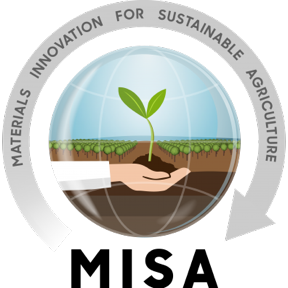Home > Press > New Agricultural Research Center Debuts at UCF
 |
Abstract:
A newly established UCF agricultural center with the goal of combating crop disease and feeding the world’s growing population debuted recently with an inaugural symposium.
New Agricultural Research Center Debuts at UCF
Orlando, FL | Posted on October 12th, 2016The two-day conference of the MISA Center of Excellence – which stands for Materials Innovation for Sustainable Agriculture – brought together dozens of representatives from the University of Central Florida and other universities, government, national laboratories, regulatory agencies, farming and the agrochemical industry.
With world population projected to reach 9.7 billion by 2050, now is the time to work together to safeguard agriculture, said MISA Director Swadeshmukul Santra, an associate professor with joint appointments in UCF’s NanoScience Technology Center and Department of Chemistry.
“Our world is facing unprecedented challenges with the rising human population that demands doubling of food production levels by 2050,” Santra said. “To achieve higher production levels, technological advancements are warranted to protect crops against emerging threats, particularly microbial-origin diseases. There is no better time than now to secure our future while minimizing negative impact on the environment.”
MISA is the first agriculture-related center at UCF. It grew out of Santra’s own research into the use of nanoparticles to fight agricultural diseases such as citrus greening and tomato bacterial spot. Santra already works closely with researchers at the University of Florida’s Institute of Food and Agricultural Sciences.
In awarding Santra a $1.9 million research grant in January, the U.S. Department of Agriculture recognized UCF as a “Center of Excellence” due to its capability and effectiveness as a research institution.
The MISA symposium featured a keynote address by Thomas Bewick, national program leader of the Division of Plant Systems-Production for the USDA’s National Institute of Food and Agriculture, who discussed the need for haste in addressing crop disease.
The MISA center is envisioned as a global platform for scientists, growers, regulatory agencies and industry to exchange ideas and skills. Its goals include coordinating research efforts, improving academic and public education on agricultural diseases, and developing practical and economically feasible treatment methods.
The center is currently based at the NanoScience Technology Center, but is expected to move to the Interdisciplinary Research Building once its construction is completed.
####
About University of Central Florida
The University of Central Florida, the nation’s second-largest university with more than 63,000 students, has grown in size, quality, diversity and reputation in its first 50 years. Today, the university offers more than 200 degree programs at its main campus in Orlando and more than a dozen other locations. UCF is an economic engine attracting and supporting industries vital to the region’s future while providing students with real-world experiences that help them succeed after graduation.
For more information, please click here
Contacts:
Mark Schlueb
UCF News & Information
407-823-0221
mobile 407-399-8352
Copyright © University of Central Florida
If you have a comment, please Contact us.Issuers of news releases, not 7th Wave, Inc. or Nanotechnology Now, are solely responsible for the accuracy of the content.
| Related News Press |
News and information
![]() Simulating magnetization in a Heisenberg quantum spin chain April 5th, 2024
Simulating magnetization in a Heisenberg quantum spin chain April 5th, 2024
![]() NRL charters Navy’s quantum inertial navigation path to reduce drift April 5th, 2024
NRL charters Navy’s quantum inertial navigation path to reduce drift April 5th, 2024
![]() Discovery points path to flash-like memory for storing qubits: Rice find could hasten development of nonvolatile quantum memory April 5th, 2024
Discovery points path to flash-like memory for storing qubits: Rice find could hasten development of nonvolatile quantum memory April 5th, 2024
Openings/New facilities/Groundbreaking/Expansion
![]() OCSiAl expands its graphene nanotube production capacities to Europe June 17th, 2022
OCSiAl expands its graphene nanotube production capacities to Europe June 17th, 2022
![]() GLOBALFOUNDRIES Moves Corporate Headquarters to its Most Advanced Semiconductor Manufacturing Facility in New York April 27th, 2021
GLOBALFOUNDRIES Moves Corporate Headquarters to its Most Advanced Semiconductor Manufacturing Facility in New York April 27th, 2021
![]() Oxford Instruments Plasma Technology relocates to advanced manufacturing facility: Move driven by exceptional business growth February 12th, 2021
Oxford Instruments Plasma Technology relocates to advanced manufacturing facility: Move driven by exceptional business growth February 12th, 2021
Academic/Education
![]() Rice University launches Rice Synthetic Biology Institute to improve lives January 12th, 2024
Rice University launches Rice Synthetic Biology Institute to improve lives January 12th, 2024
![]() Multi-institution, $4.6 million NSF grant to fund nanotechnology training September 9th, 2022
Multi-institution, $4.6 million NSF grant to fund nanotechnology training September 9th, 2022
Announcements
![]() NRL charters Navy’s quantum inertial navigation path to reduce drift April 5th, 2024
NRL charters Navy’s quantum inertial navigation path to reduce drift April 5th, 2024
![]() Discovery points path to flash-like memory for storing qubits: Rice find could hasten development of nonvolatile quantum memory April 5th, 2024
Discovery points path to flash-like memory for storing qubits: Rice find could hasten development of nonvolatile quantum memory April 5th, 2024
Food/Agriculture/Supplements
![]() Silver nanoparticles: guaranteeing antimicrobial safe-tea November 17th, 2023
Silver nanoparticles: guaranteeing antimicrobial safe-tea November 17th, 2023
![]() Night-time radiative warming using the atmosphere November 17th, 2023
Night-time radiative warming using the atmosphere November 17th, 2023
![]() DGIST and New Life Group launched a research project on "Functional beauty and health products using the latest nanotechnology" May 12th, 2023
DGIST and New Life Group launched a research project on "Functional beauty and health products using the latest nanotechnology" May 12th, 2023
|
|
||
|
|
||
| The latest news from around the world, FREE | ||
|
|
||
|
|
||
| Premium Products | ||
|
|
||
|
Only the news you want to read!
Learn More |
||
|
|
||
|
Full-service, expert consulting
Learn More |
||
|
|
||








